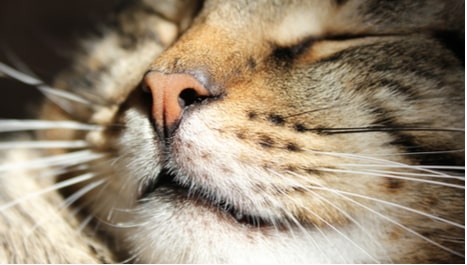
Cats purr for many reasons, and we’ve only just discovered how they do it.
Cats purr a lot when:
* Greeting familiar humans and animals
* Content and happy
* Curious
* Feeding
* Wanting something
* Grooming
* Sick or injured
Individual cats purr different amounts, and some don’t purr. A cat that purrs non-stop might be happy and content, or it may have a medical issue.
If your cat purrs a lot, there is a good chance nothing is wrong, and you just have an especially vocal and happy cat. There is a wide variation between individual cats in how loud, how often, and why they purr.
If you never owned a cat before, you may be surprised how much your new kitty purrs. Unless your cat shows other signs of sickness or distress, a lot of purring is usually nothing to worry about.
But, cats also purr when sick or injured. If your cat purrs continuously and you can’t figure out why, start by checking the cat’s overall health, appearance, and behavior to see if there could be a medical reason.
If you have owned a cat for a while and suddenly it starts purring more than usual, this can indicate a health problem. A trip to the vet is a good idea in this case.
How to tell if Your Cat’s Purring is Normal
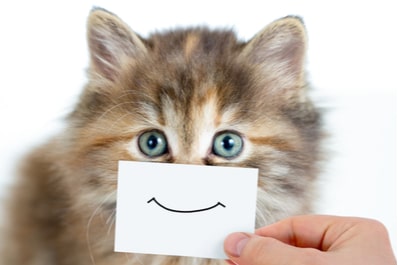
If your cat seems to be purring 24/7 , check to see if the sound you hear from the cat is actually coming from the throat where normal purring happens.
Gently put one of your fingers on the cat’s throat while it’s purring, and check to see if you feel a vibration. If so, the sound is a purr and not something else.
Next, check to see if the purring sound happens when the cat inhales and exhales. If you only feel the purr on one or the other breath, take the cat to the vet for a check-up. It may have a respiratory problem.
The next thing to check if your cat purrs non-stop is the cat’s general health and behavior.
- Have you noticed changes in the cat’s eating, bathroom, or sleeping habits?
- Has the cat gained or lost weight?
- Is it more aggressive lately?
- Does the cat have dilated or constricted pupils?
- Is sit’s heart beating rapidly?
- Are there changes in the cat’s activity level?
If the answer to one or more of these questions is ‘yes,’ excessive purring could signal an underlying health problem. Take the kitty to a vet’s office for a check-up.
If your cat does not have any general health problems or changes in behavior and purrs a lot, it’s probably purring for one or more reasons listed below.
Can a Cat Purr Too Much?
The act of purring by itself is not likely to be a problem for a cat. Some individual domestic cats purr much more than others, and some purr very little or not at all.
However, if a cat is purring 24/7, especially if it starts suddenly, it could indicate that something is wrong. A trip to the vet may be a good idea.
1. Cats purr when greeting people and animals they like.
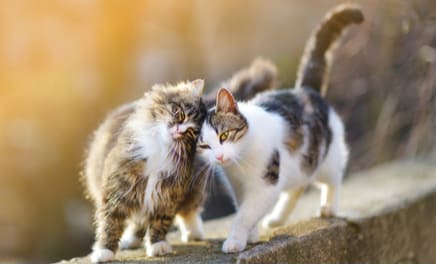
Some cat researchers use small microphones and cameras attached to cats to see what they do and listen to when they purr. They have discovered that cats regularly purr when they meet a person, another cat, or another animal they like and trust.
2. Cats purr when you pet them.
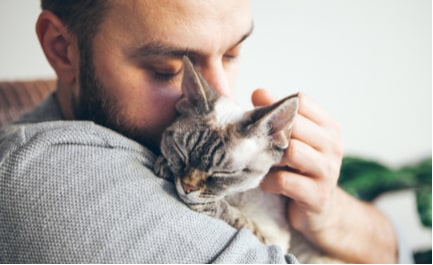
Many cats predictably purr when someone pets them or plays with them. Cats seem to purr most often because they feel content and happy, and getting petted makes most cats happy.
3. Cats purr when falling asleep.
Getting drowsy and falling asleep feels pretty good for many humans, and cats seem to think so, too. They often purr when they are relaxed and drifting off to sleep.
4. Cats purr when they are cozy and comfy.
Sitting contentedly in a basket or beloved person’s lap is enough to get many cats purring loudly. Cats are likely to purr as they settle into a comfy location for a good, long session of sitting around.
5. Nursing mother cats often purr.
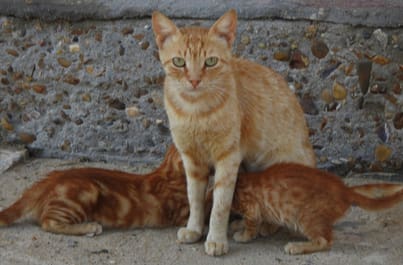
Feeding her kittens prompts purring in many mother cats. The purring is probably relaxing for both the mother and kittens. Purring may help establish a bond between the mother and her young, or it may be a form of communication between them.
6. Cats purr when feeling pain, fear, and stress.
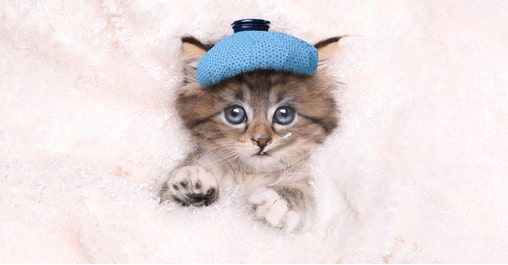
Cats also purr when in distress. My cat got very sick one day, and I have never heard her purr so loudly before or since.
Veterinarians report that injured and sick cats often arrive at the vet’s office purring loudly. The act of purring may comfort a sick or injured cat or stimulate hormones that reduce pain. Cats are even known to purr loudly at the moment of death.
One theory on how purring might have a healing effect has to do with vibrations. Cat’s purring vibrates at a frequency of 25 to 150 hertz (Hz), or cycles per second.
This frequency just happens to be in the same range as therapeutic frequencies used in human medicine. In particular, this frequency range is known to aid in the healing of bone and soft tissue.
Bone heals at the lower end of the frequency range, and soft tissues respond most at about 100 Hz. Cats may ‘tune’ their purr frequency to optimize healing.
The vibrations of a cat purring can even aid healing in humans, according to some research. Cats are sometimes used in hospital and nursing home settings because their purring can be so therapeutic for people.
7. Cats purr when they want something.
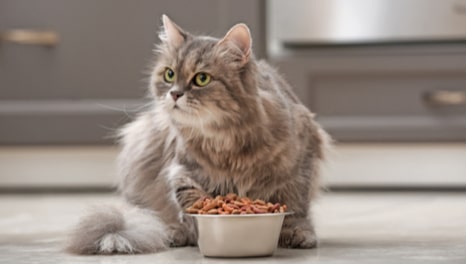
Purring can be a form of cat communication. If your cat loudly purrs and meows when you get home, it’s telling you something, most likely that it’s hungry, wants attention, or wants to go outside.
The “I want something” purr is called a solicitation purr. This sound mixes a meow and a purr, and it creates a response in people similar to hearing the sound of a human infant.
8. Cats purr when exploring new environments.
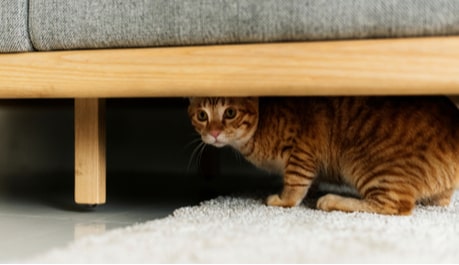
Cats are curious, and feeling curious is a pleasure they seem to enjoy because it often makes them purr.
9. Cats purr during grooming.
If you brush or comb your cat’s hair, this also may bring on the purring. Even wild cats that purr produce this sound when they groom each other.
How Cats Purr
In the past, people thought that cat purring sounds were controlled by blood flow in the heart, but research now reveals a different explanation.
Animal researchers now know that purring occurs in the vocal chords and larynx and is controlled by the cat’s central nervous system.
Purr vibrations happen between 25 and 150 cycles per second as the cat inhales and exhales, causing sounds that are audible to cats and humans.
Cats can mix in other sounds while they purr, adding meows and cries, depending on the situation. You might hear this type of mixed sound when you open a can of cat food in front of your cat, and it responds by meowing and purring together.
Kittens start purring a few days after birth, and they also purr a lot when feeding. This behavior may be why cats purr when you feed them: Eating brings back fond memories of mom.
While we now know more clearly how a cat purrs, we still don’t fully understand what is going on in a cat’s brain that triggers this behavior.
Cats that Don’t Purr
Some individual domestic cats do not purr. An absence of purring may be due to damage to the larynx or a respiratory problem, but it could also be an individual difference between cats, and it may be related to early separation from the litter.
Wild cats that do not roar, such as ocelots, pumas, and cheetahs also purr like domestic cats. However, the roaring felines – lions, leopards, tigers, and jaguars – do not purr.
Domestic cats also do not typically purr when facing aggressive situations with other cats, during sex, while hunting, or when first encountering catnip.
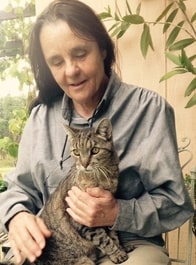
Sources:
https://pets.webmd.com/cats/why-do-cats-purr
https://www.maddiesfund.org/kb-difficult-or-labored-breathing-in-cats.htm
https://www.bbc.com/future/article/20180724-the-complicated-truth-about-a-cats-purr
https://www.bustle.com/p/11-surprising-signs-your-cat-is-sick-you-should-consult-your-vet-9023368
https://www.preventivevet.com/cats/how-can-i-tell-if-my-cat-is-in-pain
https://www.purina.com.au/cats/behaviour/purring
https://asa.scitation.org/doi/10.1121/1.4777098
https://animalpath.org/why-doesnt-my-cat-purr/
https://zslpublications.onlinelibrary.wiley.com/doi/abs/10.1111/j.1469-7998.1991.tb04749.x